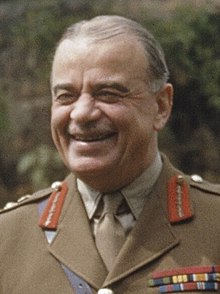
Back هايستينغز إسماي (بارون إسماي الأول) Arabic Hastings Lionel Ismay Czech Hastings Ismay, Barwn 1af Ismay Welsh Lord Ismay Danish Hastings Ismay, 1. Baron Ismay German Hastings Ismay Spanish Hastings Ismay Estonian Hastings Ismay Basque هاستینگز اسمای Persian Hastings Ismay Finnish
Hastings Lionel Ismay, 1st Baron Ismay KG, GCB, CH, DSO, PC, DL (21 June 1887 – 17 December 1965) was a British politician, diplomat and general in the British Indian Army who was the first Secretary General of NATO. He also was Winston Churchill's chief military assistant during the Second World War.
Ismay was born in Nainital, India, in 1887, and educated in the United Kingdom at Charterhouse School and the Royal Military College, Sandhurst. After Sandhurst, he joined the Indian Army as an officer of the 21st Prince Albert Victor's Own Cavalry. During the First World War, he served with the Camel Corps in British Somaliland, where he joined in the British fight against the "Mad Mullah", Mohammed Abdullah Hassan. In 1925, Ismay became an Assistant Secretary of the Committee of Imperial Defence (CID). After being promoted to the rank of colonel, he served as the military secretary for Lord Willingdon, the Viceroy of India, then returned to the CID as Deputy Secretary in 1936.
On 1 August 1938, shortly before the outbreak of the Second World War, Ismay became the Committee's Secretary and began planning for the impending war. In May 1940, when Winston Churchill became Prime Minister of the United Kingdom, he selected Ismay as his chief military assistant and staff officer. In that capacity, Ismay served as the principal link between Churchill and the Chiefs of Staff Committee. Ismay also accompanied Churchill to many of the Allied war conferences. For Ismay's advice and aid, "Churchill owed more, and admitted that he owed more" to him "than to anybody else, military or civilian, in the whole of the war."[1]
After the end of the war, Ismay remained in the army for another year, and helped to reorganise the Ministry of Defence. He then retired from the military and served as Lord Mountbatten of Burma's Chief of Staff in India, helping to oversee its partition. From 1948 to 1951, he served as chairman of the council of the Festival of Britain, helping to organise and promote the event. Then, in 1951, when Churchill again became Prime Minister, he appointed Ismay Secretary of State for Commonwealth Relations.
Ismay accepted the position, but resigned after only six months to become the first Secretary General of NATO in 1952. While Secretary General, Ismay is also credited as having been the first person to say that the purpose of NATO was "to keep the Soviet Union out, the Americans in, and the Germans down,"[2] a saying that has since become a common way to describe the dynamics of NATO.[3][4] He served in this role until 1957, and helped establish and define the position. After retiring from NATO, Ismay wrote his memoirs, The Memoirs of General Lord Ismay, served on a variety of corporate boards, and co-chaired the Ismay–Jacob Committee, which reorganised the Ministry of Defence once again. He died on 17 December 1965, at his home, Wormington Grange, Gloucestershire.
- ^ Colville, p. 161.
- ^ NATO. "Nato - Lord Ismay".
- ^ Joffe.
- ^ Schorr.
© MMXXIII Rich X Search. We shall prevail. All rights reserved. Rich X Search
